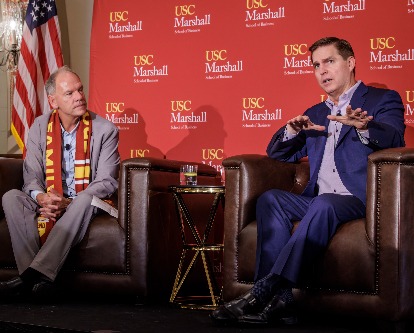You mentioned earlier that AI is taking over some of the routine practices of tax professionals. How does that affect teaching the building blocks of taxation and accounting?
MP: It could be good or bad. I would say it depends. Companies have a choice to make with AI. With AI doing that work, does that mean it frees up their associates to do more of the strategy analysis — some of the more critical thinking aspects of the work that add more value? Or does that mean that because AI is doing the tasks, we cut costs and do with fewer [associates] on your account? That’s a choice they have to make.
Personally, I think with AI, the way that we need to change our curriculum is to focus not on the mundane, repetitive routine tasks that obviously AI can do, but focus on the analysis, the critical thinking, the strategy development that you usually won’t experience or won’t be responsible for until you’re three or four years after graduation. Associates now need to be ready on day one when they join a firm to be involved in advisory right away.
The way I’m teaching my class (ACCT 551: Taxation of Partnership) now is focused on tax advisory because it’s something that AI will not threaten or will not immediately threaten, the ability to strategize for your client.
Why is it so important that Leventhal remains on the forefront of technology like this?
MP: Because AI is going to be a part of the industry, and it is imperative that we develop and graduate professionals who are ready to use and take advantage of these tools for the benefit and the advantage of their clients. That’s why we need to be at the forefront.
Leventhal is unique because of the strength of our network and the strength of the school. We not only develop tax leaders, but we develop people who can influence policy. We can be vocal in how we can shape or help regulate AI or the use of technology in this industry.
It is important for the Leventhal school to be at the forefront, not only from the perspective of benefiting our clients, but graduating professionals who are ready and able to bring the most value to their clients through AI, while standing true to our values of protecting our community and making sure that the technology is used for its best potential.
How do you stay on the cutting edge with a technology that is advancing, evolving, and shifting on a near-constant basis?
MP: This is a perfect opportunity to tell you that Leventhal is collaborating with Intuit. They have their AI research team, and we are collaborating with them in researching AI, especially how to leverage AI in taxation. They have data scientists at Intuit. The school partnered with them to make sure that our communication, our collaboration, our case studies are reflective of new and advanced AI technologies so that we are on the cutting edge.
Intuit is helping us look at how we can integrate AI into our curriculum and how best to improve the technology aspect of our curriculum. Because of the network of Leventhal, we have alumni and students that work at Intuit, and we were able to immediately get in touch with them, talk with them, and then start this partnership.
Can you talk a little bit more about the risk of over-reliance on AI?
There is a challenge in the industry on how to embrace AI but prevent your professionals from over relying on it. Ultimately, whether you’re an accountant, a lawyer, a tax professional, you’re providing a service that has to be accurate. It has to be accurate, but no one really understands how AI actually consolidates all of the information, where they get it, how they weigh information, and how they create the answers to an issue that is delivered after a prompt is given to AI.
Overly relying on AI, especially in an industry that prides its legal factual accuracy, could be very problematic. You really need to have the building blocks, to do your own follow up, or be more critical of what answers you get from AI.
How do you project the future of taxation, given AI’s mastery of technical skills?
MP: I think we need to look at what AI can’t do. The beauty of being in the service firm, it’s truly a service that is built on trust. How do you build trust in tax or law or any service firm? You build trust by delivering the highest quality of work that is factually and legally accurate. That’s one way to build trust, but you also build trust through connection. You have to be able to build client relationships, and I think that requires the soft skills that AI itself cannot provide.
Ultimately in a negotiation, conflict management, negotiation skills — those are important skills that AI can’t do for you. AI can’t negotiate for you on behalf of your client. You still have to do that. If there was a conflict between your team or between parties and a deal, AI can’t resolve that for you. Ultimately, I think new skills, with a focus on soft skills, will become even more important.
*Deloitte, Ernst & Young (EY), PricewaterhouseCoopers (PwC), and Klynveld Peat Marwick Goerdeler (KPMG).







